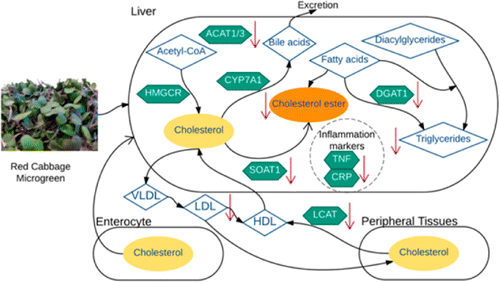Red cabbage microgreens lower 'bad' cholesterol in animal study

Microgreens are sprouting up everywhere from upscale restaurants to home gardens. They help spruce up old recipes with intense flavors and colors, and are packed with nutrients. Now testing has shown that for mice on a high-fat diet, red cabbage microgreens helped lower their risk factors for developing cardiovascular disease and reduce their weight gain. The report appears in ACS' Journal of Agricultural and Food Chemistry.
Microgreens are tender, immature plants and herbs that take only a week or two to grow before they're ready for harvesting. A growing body of research suggests that microgreens could offer more health benefits than their mature counterparts. And since previous studies have shown that full-grown red cabbage can help guard against excessive cholesterol, Thomas T.Y. Wang and colleagues wanted to see if red cabbage microgreens might have a similar or even greater effect than their larger counterparts.
To test their hypothesis, the researchers used mice that were a model for obesity. These animals also tend to develop high cholesterol and other risk factors for cardiovascular disease. The team divided 60 of these mice into different diet groups. They received food low in fat or high in fat, and with or without either red cabbage microgreens or mature red cabbage. Both the microgreens and mature cabbage diets reduced weight gain and levels of liver cholesterol in the mice on high-fat diets. But the study also showed that microgreens contained more potentially cholesterol-lowering polyphenols and glucosinolates than mature cabbage. The baby plants also helped lower LDL, or "bad," cholesterol and liver triglyceride levels in the animals.
More information: Haiqiu Huang et al. Red Cabbage Microgreens Lower Circulating Low-Density Lipoprotein (LDL), Liver Cholesterol, and Inflammatory Cytokines in Mice Fed a High-Fat Diet, Journal of Agricultural and Food Chemistry (2016). DOI: 10.1021/acs.jafc.6b03805
Abstract
Cardiovascular disease (CVD) is the leading cause of death in the United States, and hypercholesterolemia is a major risk factor. Population studies, as well as animal and intervention studies, support the consumption of a variety of vegetables as a means to reduce CVD risk through modulation of hypercholesterolemia. Microgreens of a variety of vegetables and herbs have been reported to be more nutrient dense compared to their mature counterparts. However, little is known about the effectiveness of microgreens in affecting lipid and cholesterol levels. The present study used a rodent diet-induced obesity (DIO) model to address this question. C57BL/6NCr mice (n = 60, male, 5 weeks old) were randomly assigned to six feeding groups: (1) low-fat diet; (2) high-fat diet; (3) low-fat diet + 1.09% red cabbage microgreens; (4) low-fat diet + 1.66% mature red cabbage; (5) high-fat diet + 1.09% red cabbage microgreens; (6) high-fat diet + 1.66% mature red cabbage. The animals were on their respective diets for 8 weeks. We found microgreen supplementation attenuated high-fat diet induced weight gain. Moreover, supplementation with microgreens significantly lowered circulating LDL levels in animals fed the high-fat diet and reduced hepatic cholesterol ester, triacylglycerol levels, and expression of inflammatory cytokines in the liver. These data suggest that microgreens can modulate weight gain and cholesterol metabolism and may protect against CVD by preventing hypercholesterolemia.
Journal information: Journal of Agricultural and Food Chemistry
Provided by American Chemical Society



















